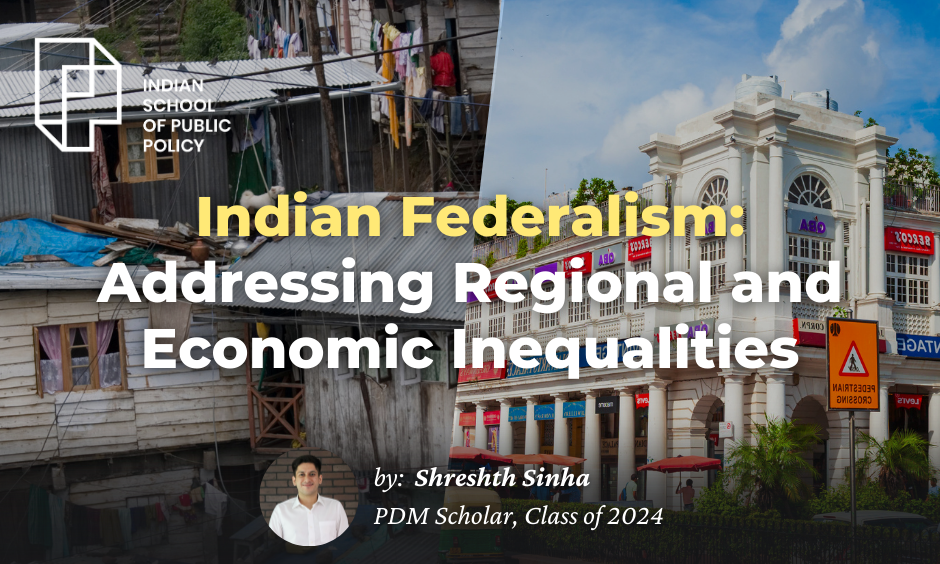
Indian Federalism: Addressing Regional and Economic Inequalities

India’s federal system, enshrined in the Constitution, has been a cornerstone of its democratic framework, designed to accommodate the nation’s vast diversity. As enshrined in Article 1 of the Constitution, India is a “Union of States,” reflecting the delicate balance between the unity and integrity of the nation and the autonomy of its constituent states. However, this intricate federal structure is facing a multitude of challenges that threaten its very foundation. Among these are the widening economic inequalities, regional disparities, the encroaching financial centralisation, and the issues surrounding representation and autonomy.
Economic inequalities between states have grown exponentially, with affluent regions like Maharashtra and Karnataka racing ahead while economically disadvantaged states like Bihar and Orissa struggle to keep pace. This divergence in wealth is mirrored in political representation, exacerbating regional tensions and fostering fears of majoritarian dominance. Highlighting the critical nature of this issue, the Supreme Court, in its landmark judgment in the Punchhi Commission case (2005), emphasised the need for fair and equitable distribution of resources among states to uphold the principles of federalism enshrined in Article 1 and the Preamble of the Constitution.
The 15th Finance Commission, tasked with recommending fiscal devolution from the centre to states under Article 280 of the Constitution, aimed to address these regional inequalities by increasing the share of tax revenues to states from 42% to 42.02%. While a 0.02% increase in the share of tax revenues from the central government to states may seem negligible in percentage terms, it represents a substantial adjustment in the context of fiscal devolution. This adjustment, recommended by the 15th Finance Commission, holds significant implications for states’ financial resources and their ability to address regional inequalities. Even a minor change in the allocation of funds can translate into substantial sums of money, enabling states to invest in crucial infrastructure, social welfare programs, and other development initiatives. Moreover, it underlines the government’s commitment to promoting equitable development and recognising the diverse needs and challenges different states face within the Indian federal system. Therefore, while seemingly small, such adjustments play a pivotal role in fostering balanced regional development and strengthening states’ fiscal autonomy. However, critics argue that the commission’s recommendations are insufficient to bridge the growing economic chasm between states, suggesting a need for a more substantial overhaul of fiscal federalism principles.
Population growth rates vary significantly across India, with slower population growth in prosperous southern states like Kerala and Tamil Nadu contrasting starkly with the rapid demographic expansion in the north. This imbalance in population growth skews resource allocation and exacerbates existing perpetuating inequalities.
The Supreme Court’s ruling in the Union of India vs. Association for Democratic Reforms case (2015) highlighted the importance of fair representation based on updated census data, in keeping with the constitutional mandate of ensuring equal representation for all citizens, as enshrined in Article 81 and Article 82. Massive interstate migration from economically deprived regions to economically vibrant states like Maharashtra and Karnataka adds to the strain on resources, necessitating robust migration policies and fair treatment of migrant workers as stipulated by the Inter-State Migrant Workmen Act (1979). The Inter-State Migrant Workmen (Regulation of Employment and Conditions of Service) Act, 1979, aimed to safeguard the rights of migrant workers, but its implementation has been uneven across states, often failing to uphold the constitutional provisions of Article 19(1)(d) and Article 19(1)(e), which guarantee the fundamental rights to move freely and reside and settle in any part of the territory of India.
Financial centralisation poses another significant challenge to Indian federalism, with central policies often taking precedence over state-specific concerns. The implementation of the Goods and Services Tax (GST) and central control over resources deepen regional imbalances, eroding states’ autonomy and democratic principles. States like Tamil Nadu and West Bengal have long demanded a greater share of their tax revenue, highlighting the need for reforms to empower states and decentralise fiscal administration in keeping with the spirit of cooperative federalism as envisioned in the Constitution. The Supreme Court, in the Goods and Services Tax Council case (2019), emphasised the need for a collaborative federal structure in the implementation of GST, in line with the constitutional provisions of Article 246A and Article 279A, which outline the division of taxation powers between the centre and states, yet the centralisation of fiscal power continues to be a point of contention.
The freeze on delimitation since 1976, based on outdated census data, continues to perpetuate unequal representation, raising concerns about the fairness and integrity of the democratic process. The Supreme Court, in the Delimitation Commission case (2003), upheld the constitutional validity of the delimitation freeze under Article 170, but urged the government to address the issue of equitable representation in line with the democratic principles enshrined in the Constitution.
Looking ahead, the 2026 delimitation exercise holds both promise and peril for Indian federalism and regional inequalities. While its objective is to ensure fair representation as mandated by Article 82, its execution must navigate complex socio-political dynamics. Depending on how it is carried out, the delimitation could either exacerbate existing disparities or promote more equitable representation. The Supreme Court’s guidelines in the Delimitation Commission case (2003) emphasise the need for transparency and adherence to constitutional principles during the delimitation process. To address these challenges, bold reforms and proactive measures are imperative. Comprehensive renegotiation of fiscal and institutional arrangements is needed to empower states and ensure equitable resource allocation, in line with the constitutional principles of federalism and the autonomy of states as outlined in Article 246 and the Seventh Schedule.
Internationally, countries like the United States face similar challenges in managing federal structures. The U.S. experience with redistricting, characterised by both successes and controversies over gerrymandering, offers valuable lessons for India in ensuring equity and representation within its federal framework. Every ten years, following the decennial census, the U.S. undergoes redistricting, akin to India’s delimitation exercise, to redraw congressional and state legislative district boundaries. However, the way redistricting is conducted, particularly regarding the practice of gerrymandering, can significantly affect federalism and exacerbate regional disparities. Gerrymandering, the manipulation of district boundaries for partisan advantage, concentrates political power in certain areas while marginalising others, leading to disparities in representation and resource allocation. Landmark U.S. Supreme Court cases like Gill v. Whitford (2018) and Rucho v. Common Cause (2019) highlight the challenges of ensuring fairness and equity in redistricting processes while upholding constitutional principles of equal representation and democratic governance. The U.S. experience underscores the importance of transparency, fairness, and accountability in delimitation to mitigate the risk of exacerbating regional inequalities, providing valuable lessons for India’s delimitation process and the promotion of equity and representation within its federal structure.
To genuinely address these challenges, India needs bold reforms that go beyond minor fiscal adjustments. A new federal compact should be forged, addressing economic disparities, migration policies, and equitable representation, in keeping with the constitutional vision of promoting the unity and integrity of the nation while enhancing the representation mechanisms in line with current demographic realities. Reforms in tax-sharing mechanisms and devolution formulas are essential to strengthen fiscal federalism and mitigate horizontal imbalances, as envisioned in Article 275 and Article 280 of the Constitution.
The Supreme Court, in the State of Karnataka vs. Union of India case (2017), highlighted the importance of cooperative federalism and urged the centre and states to engage in meaningful consultation on fiscal matters, upholding the spirit of the constitutional provisions on federal-state relations. The contrasting economic trajectories of Kerala and Bihar within the Indian federal system exemplify the critical link between federalism and economic inequality, as articulated in Article 1 of the Constitution. Despite facing similar challenges, Kerala’s emphasis on social welfare and human development has propelled it ahead, while Bihar lags behind due to persistent disparities. This highlights the urgency of addressing regional inequalities and implementing equitable policies. By fostering inter-state cooperation, respecting autonomy, and ensuring fair resource allocation, India can emulate Kerala’s success and narrow the economic gap between regions. This not only preserves the essence of federalism but also strengthens the nation’s unity and progress, ensuring that every state contributes to and benefits from India’s growth story.
Register your Interest to Study at ISPP
References:
- “Punchhi Commission case” refers to the Supreme Court judgment in Union of India & Anr. v. U.P. Shikshak Parishad & Ors. (2005) 5 SCC 1.
- “Union of India vs. Association for Democratic Reforms case” refers to the Supreme Court judgment in Union of India v. Association for Democratic Reforms & Anr. (2015) 11 SCC 246.
- “Delimitation Commission case” refers to the Supreme Court judgment in
- Union of India v. Delimitation Commission (2003) 7 SCC 150.
- “Goods and Services Tax Council case”
- Supreme Court judgment in Union of India & Anr. v. Mohit Mineral Pvt. Ltd. (2019) 2 SCC 599.
- “State of Karnataka vs. Union of India case”
- Supreme Court judgment in State of Karnataka & Anr. v. Union of India & Ors. (2017) 8 SCC 435.
- Gill v. Whitford (2018) & Rucho v. Common Cause (2019) refers to the U.S. Supreme Court case on partisan gerrymandering.

Shreshth Sinha
PDM Scholar, Class of 2024
A strategic and agile thinker who thrives to deal with ambiguous and complex problems and effectively communicate solutions. Shreshth is a graduate in the discipline of legal studies which has enabled him to understand processes of governance with regard to regulation and policy which has further helped him in actualizing solutions to the problems that lie at ground level. He is a policy enthusiast fascinated by the intersection of law, policy and governance and harbours keen interest in international relations, climate change advocacy and developmental economics.
https://www.linkedin.com/in/shreshth-sinha/


